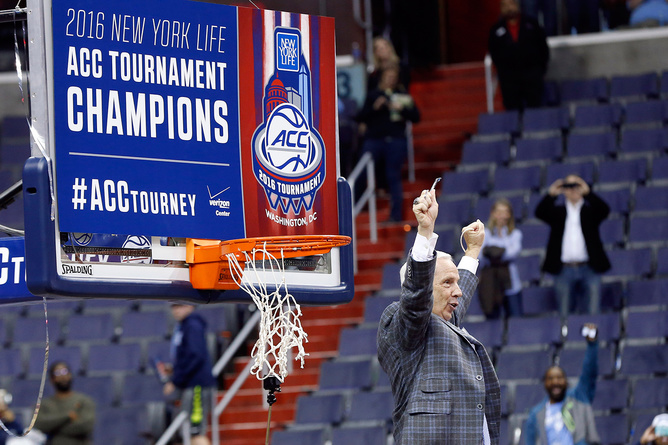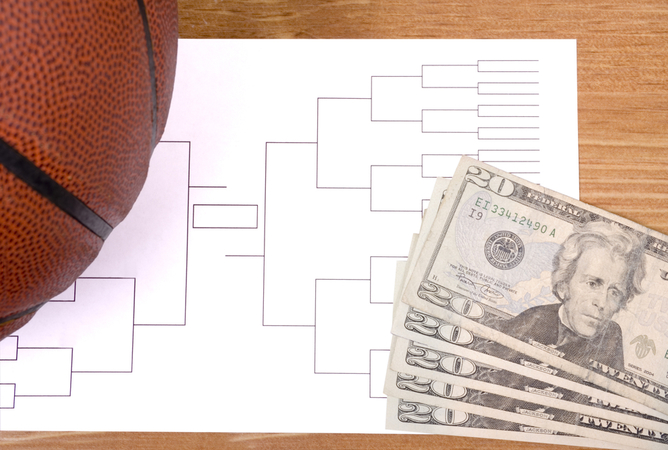By John Affleck/The Conversation
The NCAA men’s basketball tournament starts Tuesday. From then until the final on April 4, CBS Sports and Turner Broadcasting will bring you every game, focusing on the buzzer beaters, the Cinderella stories, the athletes overcoming the odds.
It’ll all end, as it always does, with confetti guns and net-cutting, and a video montage of highlights played over “One Shining Moment.”
What you won’t see much about is who benefits financially by participating in a tournament that generates hundreds of millions of dollars for the NCAA. Yes, the players earn scholarships, as will athletes in nonrevenue sports, whose schooling is also funded through tournament profits.
But one thing that gets very little attention is the fact that the men who put the basketball players through drills every day stand to go home with substantial bonuses on top of their already handsome salaries.
If the media – including CBS and Turner, but other sports news outlets as well – started to note that routinely, it would add balance to coverage that makes it seem as if the whole tournament is just played for laughs.
Why be the killjoy at the national party that is March Madness? And why accent coaches’ pay in particular?
Money-Making Machine
The answer is that coverage of the tournament focuses on the competition – the games themselves – and the surrounding hoopla so narrowly that the overall image of the three-week event is incomplete to the point of being disingenuous.
It all looks like so much fun and nothing else. But here’s the real deal. The tournament is the primary money-maker for the entire NCAA, accounting for more than 80 percent of the governing body’s $871.6 million in revenue in 2011-12, the last year for which the NCAA has posted audited numbers on its website.
Most of this money comes from the lucrative television contracts owing to the very high ratings the games draw. In 2006, for example, CBS and Turner agreed to pay $11 billion to host the tournament for 14 years beginning in 2010 – about $771 million annually.
Where do these millions of dollars go?
Not to the cities, whose taxpayers bear some of the costs of hosting the games. Research shows the host cities don’t get much indirect economic benefit to show for it either.
In fact, much of what the NCAA makes goes back to athletic conferences- college sports leagues, for the uninitiated – and schools.
As the sports governing body puts it on its website: “All but 4 percent of NCAA revenue is either returned directly to member conferences and institutions or used to support championships and programs that benefit student-athletes.”
In other words, a healthy chunk of the whole college sports scene is paid for by March Madness, the single biggest moment in the college sports calendar.
Of course, the athletes themselves don’t get compensated beyond their scholarships, despite how much money they bring in. They are playing for pride, for the chance to be champions and for the attention that brings.
However, a lot of other people – in addition to working for all those things – do get compensated. And at the top of this list are the guys on the bench with the players – their coaches.

North Carolina Coach Roy Williams, according to a contract extension signed in 2015, earned a $25,000 bonus for the Tar Heels earning a bid to the NCAA tournament./ReutersSee, while tournament money doesn’t go directly from the NCAA to coaches, it does go to schools, who pay the salaries of coaches, who often receive bonuses for various performance metrics, including their teams making and advancing in the NCAA tournament.
Many of the 68 schools that will play in the 2016 tournament are public universities and colleges, which means two things.
One, those coaching salaries, many in the millions, are the people’s money, and the public has a right to know how its cash is being spent. It’s arguable that the media – particularly independent news organizations reporting on the tournament – even have an obligation to remind the world of coaches’ contracts at this time of year.
Two, in most cases, the salaries and bonuses of those coaches are a matter of public record. It’s not hard to request the contracts of basketball coaches or find them online, so the media’s task would not be onerous. Often, journalists may be so caught up in game coverage they don’t think to check – that’s my excuse for why I didn’t look up the coaches’ contracts when I covered the Final Four in 2012 with the Associated Press.
Nonetheless, it took me just two clicks to locate the contract of Kentucky’s John Calipari, which the school posted on the web. He’ll get an extra $100,000 if the Wildcats make the Sweet Sixteen, another $175,000 if they reach the Final Four and $375,000 more if they win the national title.
To review, if Kentucky wins the national title, its coach gets $650,000 in bonus money. Its players get nothing.
Worth mentioning on TV?
USA Today has a notable tradition of creating a database of tournament coaches’ salaries that includes a “maximum bonus” column, and it isn’t the only paper that has shone a light on the hundreds of millions of dollars generated by the NCAA tournament and the people it benefits.
Yet those stories tend to be one-offs that fade away quickly at a time when Americans fill out 40 million tournament brackets and typically wager about $9 billion – more than double during the Super Bowl – most of it illegally.
Once the ball is tipped, fans care mostly about winning.

Fans are expected to wager $9 billion during the tournament, more than double bets on the Super Bowl./NCAA brackets via www.shutterstock.com
But the purpose of the bonus exercise wouldn’t actually be reform – it would be about creating well-rounded sports coverage and informing the public.
It’s the difference between a single story, or series of stories, as in the case of recent reporting on college sports finances by the Washington Post, and a steady reminder that could change the nature of how the media frames the sports landscape.
If CBS/Turner made the first move toward that by flashing an infographic on the screen early in each of the NCAA tournament’s 65 game with the coaches’ salaries and potential bonuses at stake, then discussed it for 30 seconds, it would help the American public understand at deeper level the business side of March Madness.
It also would send a message that the media is willing to be transparent about financial implications of the events it covers. That’s nothing more or less than good reporting.
–
John Affleck is the Knight Chair in Sports Journalism and Society at Pennsylvania State University. This article was originally published on The Conversation.
–
Comments welcome.
![]()
Posted on March 15, 2016


